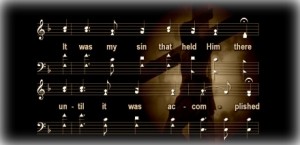 There are certain songs I just can’t sing anymore (the above isn’t one of them).
There are certain songs I just can’t sing anymore (the above isn’t one of them).
I may love the style and may even have beautiful memories attached to them, but when I really think them through, I don’t want to hear those words leaving my mouth headed to God’s ear.
Because they’re bad theology.
And I am talking about religious songs here. Granted, most songs that make it into our church services are there (hopefully!) because they hold God’s truths. And many songs that we sing along with on our Christian radio stations are also God-honoring.
But you can’t depend on it. Before you let the words stream out of your mouth, think them through. Are they pleasing to God? Are they true? Do they echo scripture?
This isn’t about worship wars, the debate between traditional hymns versus contemporary praise music. This is bigger than that. This is about accurate content versus false. Truth versus lies.
Songs we sing will either reinforce good theology or perpetuate bad theology.
Use songs as prompts for more Bible study. Take a song you absolutely love and trace its message back to its biblical roots. Then jot the scripture reference in your hymnal or CD insert, and write the song title in the margin of your Bible by that verse.
While songs that come straight from scripture are easiest to track (I love those!), don’t rule out studying those whose themes don’t necessarily match word for word passages.
Stuart Townend is a current songwriter who expounds on the central gospel theme in many of his songs. He has penned such greats as “In Christ Alone”, “The Power of the Cross”, “The King of Love”, “Beautiful Savior”.
“How Deep the Father’s Love” is one of my favorites for the way Townend weaves the story of redemption in his strong and emotional lyrics. Here are a few stanzas and a few scriptures:
How deep the Father’s love for us
How vast beyond all measure
That He should give His only Son
To make a wretch His treasure
(See Ephesians 3:18-19; John 3:16; Psalm 135:4)How great the pain of searing loss
The Father turns His face away
As wounds which mar the chosen One
Bring many sons to glory
(See Matthew 27:46; Luke 23:35; Hebrews 2:10)I will not boast in anything
No gifts, no power, no wisdom
But I will boast in Jesus Christ
His death and resurrection
(See Galatians 6:14)
In contrast, when I was a child my church sang many songs about “work.”
…Work thro’ the morning hours
Work while the dew is sparkling
Work ‘mid spring flow’rs…O land of rest, for thee I sigh!
When will the moment come…To the work! To the work!
Toiling on, toiling on, toiling on…Thro’ the long and toilsome day
‘Neath a blazing, burning sun
Bear the heat, pursue your way
Till your task is done
Work, work for Jesus
Work, work today
Yes, we are to work for Jesus (1 Corinthians 15:58). Many scriptures point to this. But the message I picked up from these songs was to work for my salvation instead of rest in Christ’s work of salvation (Hebrews 10:10,14; Matthew 11:28-29).
So when I hear those songs now, I can’t sing them in good conscience.
Some songs might only need a word change here or there to make the song biblically sound. At my church we’ve tweaked “Days of Elijah” from:
And these are the days of Your servant David
Rebuilding a temple of praise
to
And these are the days of Your servant Ezra
Rebuilding a temple of praise
because we know King David wasn’t allowed to build the temple even the first time (1 Chronicles 22:8), and Ezra was in charge of rebuilding the second temple (Ezra 7).
Occasionally I’ll just drop out from singing a stanza if I can’t sing the lyrics sincerely. And my friend Linda often changes the group pronouns to the more personal “I” when she sings.
So be diligent and study the words you sing to yourself, to God, to others. We’re just as accountable for the words we sing as the words we speak. Let’s use words of songs as the powerful tools they are to teach and encourage each other (Colossians 3:16) as we praise and give thanks to our Father.
Further reading:
10 Principles for Congregational Singing, Part 1, Part 2
How has a song helped you? What is one of your favorites?


This post definitely strikes a chord! I love songs (like “How Deep”) that celebrate the Resurrection, which are all too few. My Bible reading plan has me read through the book of Acts every month, and I’ve begun to realize the early church spoke far more of the Resurrection than the crucifixion. That is where the power of our salvation lies!
And yeah, I grit my teeth through “Hold the Fort” (Hello? We’re on the offensive, remember?) One of these days I’m going to sneak in and paste “A Glorious Church” over it in every hymnal ;)
I loved this post. The words are so important. They are so many scriptures that speak to how important the words we speak, hear, and think are. I hear many people say that they listen only to the music but never hear the words but our unconscious does and it limits us from hearing the words of God. Mark 4:9 Then Jesus said, “Whoever has ears to hear, let them hear.”
Yes and Amen!
I agree that there are time it is best to simply not sing a line or two, better than lips speaking words that are untrue…
I never confused those “work songs” with salvation (I am only familiar with a couple of them.)
Nevertheless I do agree that we need to be careful about correct theology in music. One former pastor of mine was known as the “amender of hymns” because he always corrected what he thought was wrong in them, and he used to say we get more theology from our singing than the preaching because we see the words, hear them, and speak them ourselves.
We need to be careful of mindless singing as well. There is an old hymn called “Ye Must Be Born Again” that has an echo of the word “again” in the chorus, and one day my husband heard and usher singing, “Ye must be born again and again” — definitely wrong theology! And he didn’t even realize what he was doing.
Interestingly, I just had a thought similar to this about a song from my childhood. The song was Onward Christian Soldier. I don’t know why it popped into my head, but songs from my life always do. I pondered the lyrics and thought they most certainly have an aggressive tone and sound quite legalistic. Many songs from that era were most definitely legalistic, as were what seemed like a majority of the people in the church I grew up in.
As I admitted that was the overall feel of that day, I also thought about how many of us as Christians refuse to speak boldly, even with our actions in many cases. My heart breaks for a country that was founded on the principles of God’s word and yet the ones who know Him allow the enemy to ride rough shod over His church. i don’t think Paul or Peter would stand silently by.
i think of God’s word to Job, “Stand up and answer me like a man.” and “Gird your loins.” I think of Paul’s words to Timothy, “God didn’t born you with the spirit of timidity.” I fear while many of the songs are soft and I want my heart to be there in worship. There is a time to stand, not in defiance, but in honor of our God.
Sorry for rambling, these are more about questions. I am perplexed by the actions and non-actions of us, the church. Thanks for letting me share my thoughts, yours sparked mine.
Bad theology in songs is a pet peeve of mine. It is frustrating to see songs gain popularity, yet be pointing us away from Christ. I don’t think it is done intentionally, but it seems as if some are more concerned with finding a good rhyme than lining up with scripture.
Great post!
There is a Christian minister I know that has issue with the children’s song Jesus Loves Me because it says “we are weak but He is strong.” His point is that it conditions us to think thoughts of doubt when Jesus gave us power over all the power of the enemy (Lk 10:19), and the Lord is the strength of our life (Ps. 27:1). Also, why should we feel like a failure when we are more than conquerors through Him (Romans 8:37)? So I change it with my kids to “if I’m weak, He is strong,” because that seems more accurate.
Great idea to trace back the Scriptures that song lyrics came from!
I assume you’re already familiar with sovereigngracestore.com, and that they have free lead sheets? Here is one of my favorites, by Steve and Vicki Cook (some of my favorite songwriters)
“I Come By the Blood”
http://www.sovereigngracestore.com/Product/M4055-11-55/I_Come_by_the_Blood_LEAD_SHEET.aspx
Be careful not to put our own individual interpation on songs and thus throw out the baby with the bath water.
It’s not about me, it is about HIM. Do sing with meaning and thought.
david
The Elijah song phrase about rebuilding I think is referring to Amos 9:11 “the tabernacle of David’ in the KJV (the song language seems to be worked from that version) so I think its intended to be a declaration of prophetic fulfillment concerning what Jesus has done and is doing as James declares in Acts 15:16. So there may be no need to change that line in the song